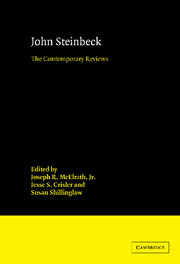Book contents
- Frontmatter
- Contents
- Series Editor's Preface
- Introduction
- 1 Cup of Gold (1929)
- 2 The Pastures of Heaven (1932)
- 3 To a God Unknown (1933)
- 4 Tortilla Flat (1935)
- 5 In Dubious Battle (1936)
- 6 Of Mice and Men (the novel, 1937)
- 7 The Red Pony (1937)
- 8 Of Mice and Men (the play, 1937)
- 9 The Long Valley (1938)
- 10 The Grapes of Wrath (1939)
- 11 The Forgotten Village (1941)
- 12 Sea of Cortez (1941)
- 13 The Moon Is Down (the novel, 1942)
- 14 The Moon Is Down (the play, 1942)
- 15 Bombs Away (1942)
- 16 Cannery Row (1945)
- 17 The Wayward Bus (1947)
- 18 The Pearl (1947)
- 19 A Russian Journal (1948)
- 20 Burning Bright (the novel, 1950)
- 21 Burning Bright (the play, 1950)
- 22 The Log from the Sea of Cortez (1951)
- 23 East of Eden (1952)
- 24 Sweet Thursday (1954)
- 25 The Short Reign of Pippin IV (1957)
- 26 Once There Was a War (1958)
- 27 The Winter of Our Discontent (1961)
- 28 Travels with Charley in Search of America (1962)
- 29 America and Americans (1966)
- 30 Journal of a Novel: The East of Eden Letters (1969)
- 31 The Acts of King Arthur and His Noble Knights (1976)
- 32 Working Days: The Journals of The Grapes of Wrath 1938–1941 (1989)
- Index
Introduction
Published online by Cambridge University Press: 03 May 2010
- Frontmatter
- Contents
- Series Editor's Preface
- Introduction
- 1 Cup of Gold (1929)
- 2 The Pastures of Heaven (1932)
- 3 To a God Unknown (1933)
- 4 Tortilla Flat (1935)
- 5 In Dubious Battle (1936)
- 6 Of Mice and Men (the novel, 1937)
- 7 The Red Pony (1937)
- 8 Of Mice and Men (the play, 1937)
- 9 The Long Valley (1938)
- 10 The Grapes of Wrath (1939)
- 11 The Forgotten Village (1941)
- 12 Sea of Cortez (1941)
- 13 The Moon Is Down (the novel, 1942)
- 14 The Moon Is Down (the play, 1942)
- 15 Bombs Away (1942)
- 16 Cannery Row (1945)
- 17 The Wayward Bus (1947)
- 18 The Pearl (1947)
- 19 A Russian Journal (1948)
- 20 Burning Bright (the novel, 1950)
- 21 Burning Bright (the play, 1950)
- 22 The Log from the Sea of Cortez (1951)
- 23 East of Eden (1952)
- 24 Sweet Thursday (1954)
- 25 The Short Reign of Pippin IV (1957)
- 26 Once There Was a War (1958)
- 27 The Winter of Our Discontent (1961)
- 28 Travels with Charley in Search of America (1962)
- 29 America and Americans (1966)
- 30 Journal of a Novel: The East of Eden Letters (1969)
- 31 The Acts of King Arthur and His Noble Knights (1976)
- 32 Working Days: The Journals of The Grapes of Wrath 1938–1941 (1989)
- Index
Summary
John Steinbeck did not particularly like book critics, “these curious sucker fish who live with joyous vicariousness on other men's work and discipline with dreary words the thing which feeds them.” It is hardly surprising. Each book published in his lifetime was attacked by prestigious reviewers, and for a highly sensitive man the criticism bit deeply. “Once I read and wept over reviews,” he wrote in 1954; “then one time I put the criticisms all together and I found that they canceled each other out and left me nonexistent.” That complaint points to the central feature of this collection of reviews. With the publication of each book, Steinbeck was both roundly attacked and as widely lauded. Reading the reviews in American, English, and Canadian magazines and newspapers, one is struck by the consistency of dissent; even books considered his weakest—Burning Bright and The Wayward Bus—received plaudits from important reviewers. There was never a consensus on a Steinbeck text.
Still, a common and persistent misconception about Steinbeck's work is that critics panned the post-Grapes fiction. That assumption became commonplace in the 1960s. Writing in the Saturday Review in 1969 about the posthumously published journal of a Novel, Lawrence William Jones posited this view of Steinbeck's career: “Steinbeck's post-war reception was one of nearly unrelieved and often misdirected hostility. Of the eight fictional works published during this period, only The Pearl was even fleetingly praised, and it has inevitably suffered from constant comparison with Hemingway's The Old Man and the Sea.”
- Type
- Chapter
- Information
- John SteinbeckThe Contemporary Reviews, pp. ix - xxivPublisher: Cambridge University PressPrint publication year: 1996

